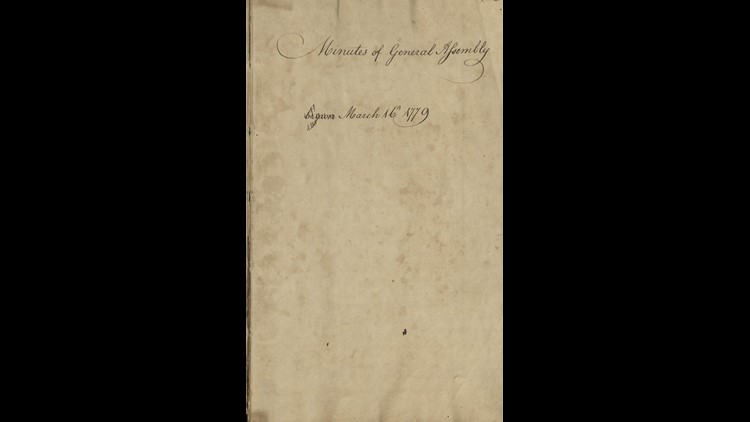DAUPHIN COUNTY, Pa.– A long lost original 1779 minute book of Pennsylvania’s unicameral Revolutionary General Assembly was returned to Pennsylvania for safekeeping in the Pennsylvania State Archives.
“The return of this volume fills a gap in the early legislative record, providing a more complete story of Pennsylvania’s early governmental proceedings,” says Pennsylvania State Archivist David Carmicheal.
The book, with entries dated from March 16 through September 27, 1779, and pages numbered 1 through 183, is the volume that immediately preceded the oldest assembly minute book in the State Archives, which begins on page 184, dated September 28, 1779. At one time the two books may have been kept together as a set.
The book was written in several different hands, one of which is similar to the handwriting in the later 1779 minute book held by the State Archives. Although John Morris Jr. was clerk of the General Assembly at that time, a comparison of a petition written by him with the donated volume did not prove conclusively that he was one of the scribes. With numerous notations and insertions that had been attached by glue, the book may have been a “rough copy” of the assembly’s minutes.
The story of the book’s return to Pennsylvania began on July 6, 2018, when Monica Rumsey, a member of the board of the Belden Noble Memorial Library in Essex, New York, contacted Jonathan Stayer, supervisor of Reference Services at the State Archives, regarding a volume that had been placed at the library with other historical books for review by that institution’s staff or board members. Rumsey studied the collection and determined that one of the items had a Pennsylvania connection. She identified it as “Minutes of the General Assembly, March 16, 1779.”
Stayer determined that the volume in question was authentic and communicated to Rumsey the State Archives’ desire to see it returned to the commonwealth.
Rumsey contacted the book’s owner, Edie Morris of Mechanicville, New York, who agreed to present it to the State Archives. Morris descends from families long settled in the Essex area, and she had inherited a family homestead nearby in which the volume was found. Morris was uncertain how the minute book came into the possession of her family; however, she has ancestry in Colonial-era Philadelphia families.
Preferring that the minute book not be shipped to the Pennsylvania State Archives through postal mail or a delivery service, Stayer traveled to Essex to accept the donation. On August 3, Stayer officially received the minute book from Morris at the Belden Noble Library in Essex.
Upon its arrival to the State Archives, the volume was accessioned and placed in the archives’ high-security vault with the other Revolutionary War–era minute books of Pennsylvania’s legislature.
State Archivist Carmicheal added that this kind of happy ending rarely occurs.
“Generally, in Pennsylvania, lost or stolen government records are returned to state custody only if they are in the hands of a person like Edie Morris, who believes in doing the right thing,” Carmicheal said. “More often, people sell such records for personal gain and ignore the fact that this is a public record, paid for by public funds, that belongs to the people of the commonwealth.”
Many states have strong replevin laws to protect public records from intentional or accidental removal from public custody, but Pennsylvania has no such law. So far, efforts to pass a replevin law in the state have been unsuccessful.
“I admire Ms. Morris for returning this document to its rightful home,” Carmicheal said, “and I look forward to the day when we have tools to recover records from people who do not share her sense of responsibility.”
The public may view the book by appointment only. Contact the State Archives at 717-783-3281 at least two days in advance of an intended visit. The cover and selected pages from the volume can be viewed online.
The Pennsylvania State Archives, part of the Pennsylvania Historical & Museum Commission, collects, preserves and makes available for study permanently valuable public records, with particular attention given to the records of state government. It also collects papers of private citizens and organizations relevant to Pennsylvania history.
Included among the State Archives’ holdings are more than 195 million pages of documents and manuscripts; 20,000 reels of microfilm containing some 22 million images of county deeds, wills, mortgages, estate papers and assessment books; and more than 1 million special collection items, such as photographic prints and negatives, maps, postcards, posters, audio recordings and motion pictures.
More information on the State Archives, including thousands of documents online, is available at www.PAStateArchives.com.
SOURCE: Pennsylvania Historical & Museum Commission



